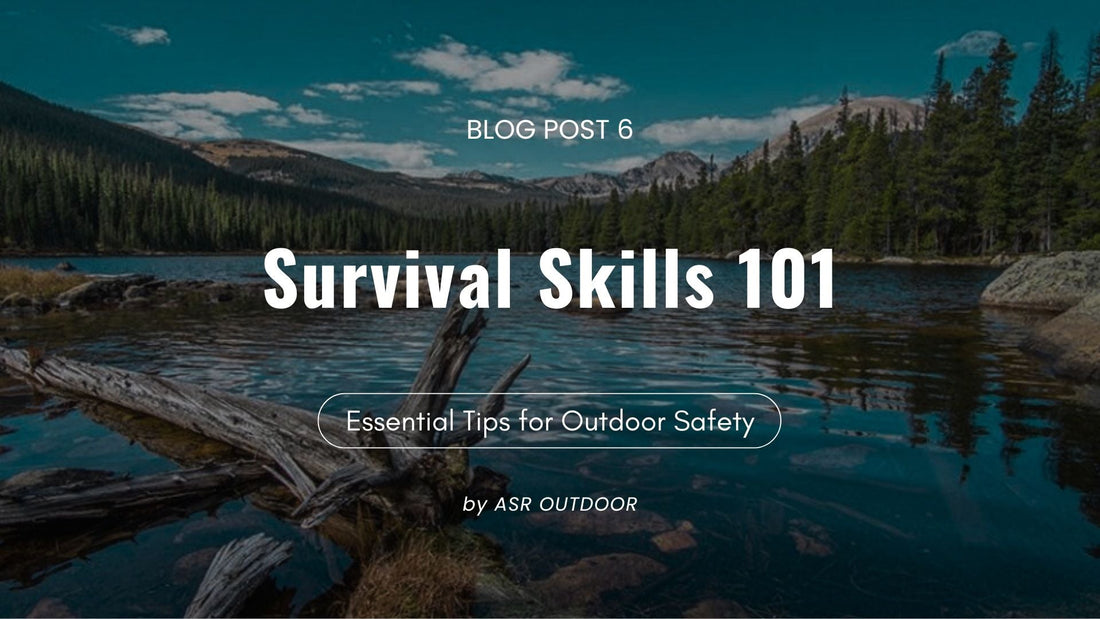
The Basics of Staying Safe in the Wilderness
Survival Skills 101: How to Stay Safe in the Wild
Essential Tips for Outdoor Safety
You could be trekking through towering mountains, pitching a tent in a dense forest, or blazing new trails in untouched wilderness, the outdoors is a playground for adventure seekers. As exhilarating as it is to explore nature’s beauty, it’s critical to respect its unpredictability. The wild can be breathtaking but also unforgiving, and staying safe is key to ensuring your journey remains memorable for all the right reasons.
In this guide, we’ll dive into essential wilderness safety practices, from preparation and navigation to survival skills and emergency responses. Whether you’re a seasoned adventurer or just starting out, these tips will equip you to embrace the outdoors responsibly and confidently.

Prepare for Your Adventure
Preparation is your first line of defense against the unexpected. A well-thought-out plan and the right gear can turn potential challenges into manageable situations.
Know Your Route and Location
Research your destination thoroughly before heading out. Study the terrain, forecasted weather, and any wildlife you might encounter. Identify potential hazards like steep trails or unpredictable weather patterns. Share your itinerary—route details and estimated return time—with someone you trust. This simple step ensures help can be mobilized if you don’t return as planned.
Pack the Essentials
Your survival kit is your lifeline. Make sure it includes:
- Water and high-energy food (like trail mix or jerky)
- A first aid kit with essentials like bandages and antiseptics
- Navigation tools: a map, compass, or GPS device
- A flashlight or headlamp with extra batteries
- Fire-starting supplies (waterproof matches or a lighter)
- Weather-appropriate clothing (rain gear, layers, gloves, etc.)
- Emergency signaling devices like a whistle or mirror
These items aren’t just gear—they’re peace of mind when venturing into the unknown.

Navigate with Confidence
Getting lost can turn an adventure into a nightmare. Mastering navigation skills ensures you stay on course and avoid unnecessary risks.
Learn Traditional Navigation Skills
While GPS devices are handy, they’re no substitute for knowing how to read a map and use a compass. Practice these skills before heading out; they could save your life if technology fails. Stick to marked trails whenever possible—they're safer and easier to follow. If you must venture off-trail, mark waypoints or landmarks to retrace your steps if needed.
Stay Hydrated and Nourished
Exploring the wild demands energy and focus, making hydration and nutrition non-negotiable.
Water Sources
Always carry enough water for your trip but also know how to locate and purify water in the wild. Streams or lakes can be lifesavers, but untreated water may carry harmful pathogens. Use filtration systems or boil water before drinking.
Food Choices
Pack lightweight yet calorie-dense snacks like energy bars or dried fruit. If you're embarking on a longer adventure, learn how to identify safe edible plants—but rely on packed food unless you're confident in your foraging skills.
Respect Wildlife
Wildlife encounters are part of the magic of outdoor adventures—but they require caution and respect.
Avoid Attracting Wildlife
Store food securely in bear-proof containers or hang it away from your campsite. Avoid hiking at dawn or dusk when animals are most active. Make noise while hiking—clapping or talking loudly alerts animals to your presence and prevents startling them.
Reacting to Encounters
Different animals require different responses:
- Bears: Stay calm, back away slowly, and make yourself appear larger by raising your arms. If attacked, fight back targeting the bear’s face and eyes.
- Mountain Lions: Maintain eye contact and make yourself appear larger; never run as it may trigger their chase instinct.
- Snakes: Watch where you step and avoid reaching into hidden areas. If bitten, seek medical help immediately.

Know Basic First Aid and Survival Skills
Emergencies happen—being prepared can make all the difference. Learn how to treat cuts, sprains, burns, and other common injuries. Carry a first aid kit tailored to your needs and know how to use each item effectively.
Fire-Making Skills
Fire provides warmth, signals for help, and purifies water. Practice building fires with natural materials before heading out so you’re ready when it counts.
Shelter Building
A sturdy shelter protects you from harsh weather conditions. Learn how to construct one using available materials like branches or tarps.
Stay Calm in Emergencies
If things go wrong, staying calm is half the battle won. Assess your surroundings carefully before acting—panic only worsens situations. Focus on hydration, signaling for help using whistles or mirrors, and finding safe routes back to civilization.
Adventure Awaits—Stay Safe!
The wilderness offers unparalleled beauty and freedom—but it demands respect. By preparing thoroughly, mastering navigation techniques, staying nourished, respecting wildlife, and knowing survival basics, you’ll be ready for whatever nature throws your way.
Remember: every step into the wild is an opportunity for discovery—and preparation ensures those steps lead to unforgettable experiences rather than unnecessary risks. So gear up, stay safe, and let nature inspire your next adventure!
